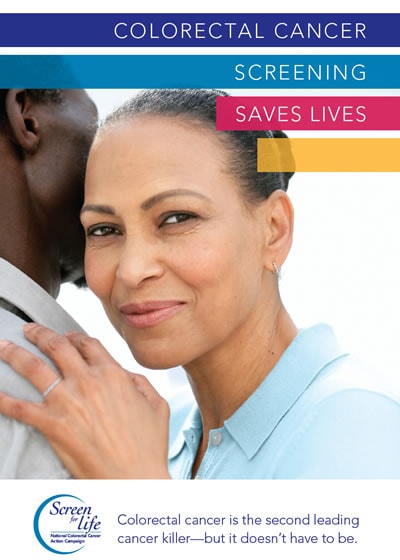Colorectal Cancer Awareness

Among cancers that affect both men and women, colorectal cancer (cancer of the colon or rectum) is the second leading cause of cancer deaths in the United States. Every year, about 140,000 Americans are diagnosed with colorectal cancer, and more than 50,000 people die from it. But this disease is highly preventable, by getting screened beginning at age 50.
Screening tests help prevent colorectal cancer by finding precancerous polyps (abnormal growths) so they can be removed. Screening also finds this cancer early, when treatment can be most effective.
What You Can Do
- If you’re aged 50 to 75, get screened for colorectal cancer regularly. If you’re between 76 and 85, ask your doctor if you should be screened.
- Be physically active.
- Maintain a healthy weight.
- Don’t drink too much alcohol.
- Don’t smoke.
Fast Facts
- Risk increases with age. More than 90% of colorectal cancers occur in people aged 50 and older.
- Precancerous polyps and colorectal cancer don’t always cause symptoms, especially at first. You could have polyps or colorectal cancer and not know it. That is why having a screening test is so important. If you have symptoms, they may include—
- Blood in or on the stool (bowel movement).
- Stomach pain, aches, or cramps that do not go away.
- Losing weight and you don’t know why.
- Some people are at a higher risk than others for developing colorectal cancer. If you think you may be at high risk, talk to your doctor about when and how often to get tested.
- There are several screening test options. Talk with your doctor about which is right for you.
- Colonoscopy (every 10 years).
- High-sensitivity guaiac fecal occult blood test (FOBT) or fecal immunochemical test (FIT) (every year).
- Sigmoidoscopy (every 10 years, with FOBT or FIT every three years).
- Sigmoidoscopy alone (every 5 years).
- Stool DNA test (FIT-DNA) every one or three years.
- CT colonography (or virtual colonoscopy) every five years.
Screen for Life: National Colorectal Cancer Action Campaign
CDC’s Screen for Life: National Colorectal Cancer Action Campaign offers resources for patients and health professionals, including print materials (fact sheets, brochures, and posters) and television and radio public service announcements.
Spread the Word! Our Screen for Life Resource Toolkit provides quick access to materials you can print and distribute or share on social media, your Web site, or blog.





















.png)












No hay comentarios:
Publicar un comentario